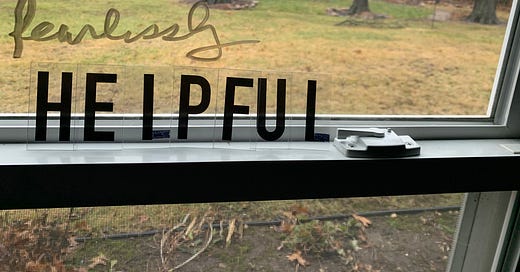013 - Listening to people give grief support, and other resources.
Welcome or welcome back!
Nancy and I were talking on Thursday evening about whether or not to write a newsletter this week. I’ve been creating lots of words in several settings. I even took a pause at my main blog (300wordsaday.com). I decided to not worry about it on Thursday evening and instead, attended to my other projects.
And then I read a book last night and listened to a podcast today and thought, “These will be helpful. I’ll just share them.”
The podcast episode is Patrick Riecke’s conversation with McKenzie Scott Lewis and Matt Burke. (All three are friends of mine.) The theme is grief and loss, particularly in a congregational setting. But in the middle of that conversation, it gets personal. If you want to hear two thoughtful people talking about their own experiences with grief, and one offering support for the other, this is a perfect example (And Matt’s holding back from that part of the conversation is perfect as well). Center for Congregations Podcast: The Weight of Grief and Loss on Apple Podcasts
And the conversation reminded me that I also talked with Matt Burke and Ben Tapper on the same podcast a year ago. Center for Congregations Podcast: Navigating Grief and Lamentation on Apple Podcasts March 30, 2022
A few weeks back, I found a book I’d heard of while shopping at a thrift store. (It’s what Nancy and I do for fun). Paul Kalanithi was finishing his neurosurgery training when he discovered he had lung cancer and switched from physician to patient. I read it last night. I seldom mark books. I noted this: “the physician’s duty is not to stave off death or return patients to their old lives, but to take into our arms a patient and family whose lives have disintegrated and work until they can stand back up and face, and make sense of, their own existence.” (p 166). That felt like work for you and me, too. When Breath Becomes Air
I talked this week with a couple people who had read my book, This is Hard: What I Say When Loved Ones Die and had actually talked together about some of the ideas. One described it as a pocket guide for what to say when you find yourself wanting to be helpful don’t know what to say. I agreed. I wrote it because I use those words all the time. You might find it helpful, too. (And if you’ve found it helpful, leaving a review would be helpful to others, too.)
Thanks for reading along with me. See you next week.
Jon





